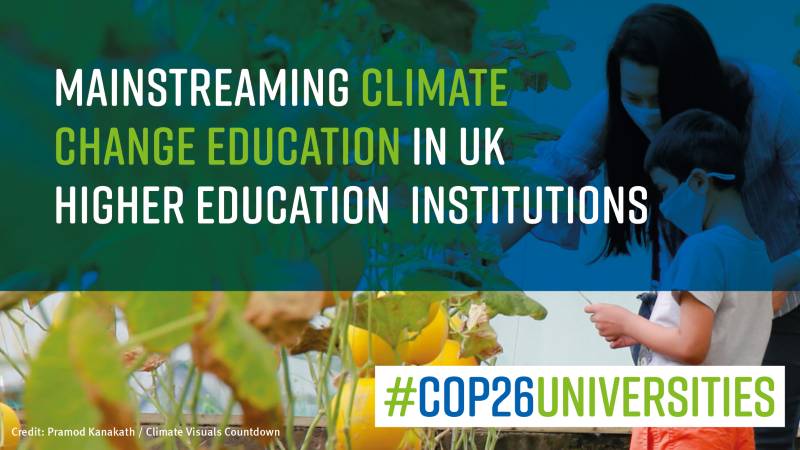Across the board approach to climate change education will prepare learners for the future

The bold, rapid action needed to tackle the climate and ecological crisis presents an unparalleled opportunity for higher education institutions, argues a working paper from a group of academic experts from the COP26 Universities Network.
Professor Vincent Nijman, Dr Esra Kurul and Dr Mina Samangooei from Oxford Brookes University contributed to the paper, through the university’s Sustainable and Resilient Futures research network. Dr Kurul and Dr Maurizio Sibilla also contributed a supporting case study about developing a new approach involving interdisciplinary teaching. This method is now available as an Open Educational Resource.
The authors from the COP26 Universities Network argue that embedding climate change education into all levels of teaching practice should be a dynamic process that responds to society’s changing circumstances, enabling higher education institutions to better serve their core purpose of preparing learners for their roles in work and wider society, now and in the future.
Dr Esra Kurul, Reader in the School of the Built Environment at Oxford Brookes University, said: “The climate crisis is impacting the communities we live in, the industries we work in, and the lives and livelihoods of others around the world. This working paper outlines the building blocks needed for mainstreaming climate change education and the barriers to implementation, as well as showcasing case studies from across the UK which highlight how successful, strategic and impactful climate change education can be.”
Dr Mina Samangooei, Senior Lecturer in the School of Architecture at Oxford Brookes University, said: “We are in a climate and ecological crisis. This working paper is a valuable guide for higher education institutions on how we can address this emergency through teaching practice as academic leaders.”
The complexity of the challenge means all teaching disciplines have a role to play and student and employer demand for climate change education reflects the need for it to be embedded in all subjects.
The path to change
The authors explore key sector issues that UK higher education institutions should consider, alongside individual and institutional barriers and external enablers. It lays out four suggestions as a starting point for embedding climate change education into all university structures:
- Building internal capacity: provision of continued professional development on climate change and paid training time for staff.
- Ensuring alignment and leadership: institutions should produce a strategy for their climate change education provision, including alignment with national and global climate targets and action, and links to the ‘invisible curriculum’, or values, of non-teaching operations
- Partnerships for curriculum development: with industry, central government, local government and third sector organisations to enable provision of climate change education
- Aligning assessment and outcomes: work with funding and regulatory bodies, unions, professional and awards agencies to ensure staff capacity and graduate attributes fully align with the demands of addressing climate change
A whole-sector approach
The working paper is supported by eleven case studies, including one Oxford Brookes University case study, showcasing a range of climate change education initiatives from UK Higher Education Institutions.
The report suggests higher education institutions develop learning outcomes for climate change education that include understanding the scale, urgency, causes, consequences of and solutions for climate change, social norms as drivers, and the ability to identify routes to direct involvement in solutions.
“Based on the case studies and our shared experiences teaching Climate Change, we conclude that with unprecedented change faced by all sectors of the economy and society, new skills and an educational focus are critical to prepare current and future generations to make decisions under uncertainty” said Vincent Nijman, Professor in Anthropology in the School of Social Sciences. “As data emerges, flexibility is crucial as we respond to the climate and ecological crises as they intensify.”
Established in 2020, the COP26 Universities Network brings together more than 80 UK universities and research institutes. They aim to improve access to evidence and academic expertise for the UN Climate Summit in Glasgow for the UK Government, NGOs and the international community, working together to deliver ambitious climate change outcomes.
Find out more about Oxford Brookes University’s work addressing global climate change challenges.
